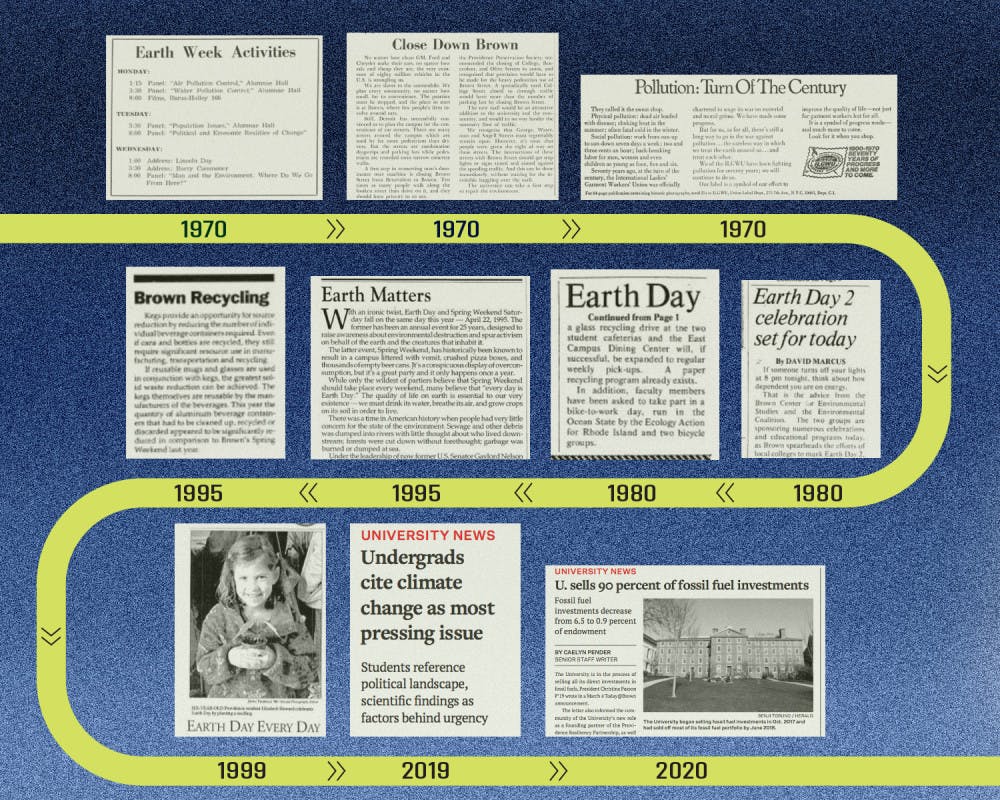This week marks the 50th anniversary of the first Earth Day, which was originally celebrated on April 22, 1970. In 1970, Earth Day involved a week-long festival of activities on campus. In the 50 intervening years, The Herald has reported on Earth Day events, published columns calling for environmental action and recounted stories of students engaged in the environmental movement since even before that first national day of celebration.
As Earth Day approached its 50th anniversary, The Herald took a dive into the archives.
In 1970, on the Monday of the inaugural “Earth Week,” The Herald printed a schedule of activities for the upcoming celebration. These included two lectures on pollution control and a panel titled “Man and the Environment: Where Do We Go From Here?”
Pollution management was a key topic during that first Earth Week. On April 20, one student columnist published a piece in The Herald entitled “Close down Brown.” The column argued, “The University can take the first step toward repairing the environment” by closing Brown Street from “Benevolent to Bowen,” and making it a pedestrian-only walkway, thus limiting pollution from cars.
An address by Barry Commoner, an ecologist hailed as one of the founders of the modern environmentalist movement, was held at 3:30 p.m. on the first Earth Day itself. The New York Times called Commoner “Planet Earth’s Lifeguard” in the headline of the obituary published when he passed away in 2012.
In 1980, Earth Day 2 was celebrated on campus. A Herald story entitled “Earth Day 2 celebration set for today,” explained that the event was a commemoration of the first Earth Day, and a rededication to environmental issues. If the focus of the first Earth Day was pollution, by 1980 it was energy. To highlight this issue, students arranged a sunrise gathering on the Main Green, and then called for one minute of darkness across campus, from 8:00 to 8:01 pm, The Herald reported at the time. The story began: “If someone turns off your lights at 8pm tonight, think about how dependent you are on energy.”
In 1995, on the 25th anniversary of the first Earth Day, a column called “Earth Matters” was printed in The Herald. That year, Earth Day landed on the Saturday of Spring Weekend. The column read: “While only the wildest of partiers believe that Spring Weekend should take place every weekend, many believe that ‘every day is Earth Day.’” It reflected on the historical ramifications of the first Earth Day 25 years prior, citing it as “a powerful example of democracy in action.” The article ended with a call to action: “Educate others about the environment, vote, recycle, boycott and, of course, enjoy Spring Weekend.”
Over the years, Earth Day has continued to be a moment of pause, appreciation and celebration marked by Earth Week festivals. In 2015, The Herald released the story entitled “Earth Week plants seeds of change.” It chronicled a week of events including a special dinner at the Sharpe Refectory to celebrate the sustainability efforts of the dining halls. At the event, Narragansett Creamery sponsored a “mozzarella stretching demonstration” and other eco-friendly dining vendors shared their products.
That year, the week’s kickoff event — a sapling exchange — had to be rescheduled due to rain. But, The Herald wrote, “the rescheduling did not hurt the week’s momentum,” according to event organizer Haily Tran ’16.
Today, the COVID-19 pandemic has forced Earth Week 2020 to adjust. While there will be no panels held in Alumnae Hall nor film showings in Barus-Holly 166 as there were 50 years ago, the Office of Sustainability is hosting a week of virtual activities. So far, they’ve featured a plant-based cooking demonstration and a series of environmental-career talks on their Facebook page.
While most students are not physically on campus to celebrate Earth Day, the past year has led to major reporting on the topic of climate change movements on campus. In March, Brown announced a plan to sell 90% of its fossil fuel investments. In December, The Herald reported on student participation in protests for the Sunrise movement, engaging in sit-ins at the Rhode Island state house. Just like in 1970, students continue to find their own ways to fight for the Earth’s health. In October, when The Herald’s Fall Undergraduate Poll asked students what the most pressing issue facing our society was, nearly 40% of students selected “Climate Change.”

ADVERTISEMENT




